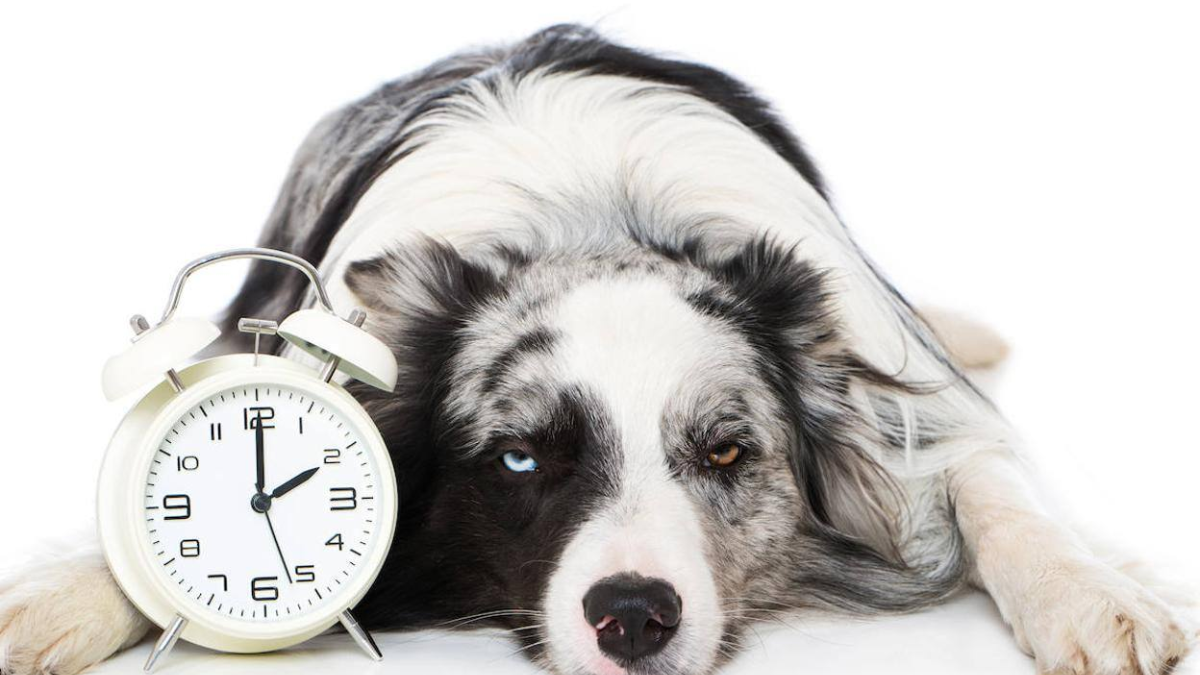Sleep disorders in dogs are a common concern among pet owners, as they can lead to a variety of health issues. Just like humans, dogs require adequate sleep for their physical and mental well-being. However, when dogs experience sleep disturbances, it can result in a range of problems that affect their overall health. Understanding The Link Between Sleep Disorders and Health Issues in Dogs is crucial for addressing these concerns effectively and ensuring the well-being of our canine companions.
Sleep disorders in dogs can manifest in different ways, including insomnia, excessive sleeping, and restless sleep. These issues can be caused by a variety of factors, such as age, breed, medical conditions, and lifestyle. When left untreated, sleep disorders can lead to a range of health issues, including obesity, diabetes, anxiety, and depression. Therefore, pet owners must understand the link between sleep disorders and health issues in dogs to ensure their furry friends are healthy and happy.

"Elevate your furry friend's overall well-being with Fi's groundbreaking collar, meticulously crafted to track your dog's sleep patterns and optimize their health. Embark on the transformative journey to safeguard their vitality by initiating advanced sleep monitoring today! Seize the opportunity to unlock the potential of enhanced rest for your cherished companion, ensuring they thrive to their fullest potential. Experience the seamless integration of cutting-edge pet care and innovative technology with the Fi Collar – Join our vibrant and inclusive community today, where passionate pet owners unite to embrace the future of pet wellness!"
Understanding Sleep Disorders in Dogs
Sleep disorders in dogs can be caused by a variety of factors, including age, breed, and underlying health conditions. Some common sleep disorders in dogs include:
- Insomnia: Dogs with insomnia have difficulty falling asleep or staying asleep, which can lead to fatigue, irritability, and other health issues.
- Sleep apnea: Dogs with sleep apnea experience pauses in their breathing during sleep, which can lead to snoring, gasping, and other breathing-related issues.
- Narcolepsy: Dogs with narcolepsy experience sudden and uncontrollable episodes of sleep during the day, which can be triggered by excitement or stress.
- Restless leg syndrome: Dogs with restless leg syndrome experience an uncontrollable urge to move their legs during sleep, which can lead to discomfort and disrupted sleep.
Dog owners need to be aware of the signs and symptoms of sleep disorders in their pets, as untreated sleep disorders can lead to a range of health issues, including obesity, diabetes, and cardiovascular disease. If you suspect that your dog may be suffering from a sleep disorder, it's important to consult with a veterinarian to determine the underlying cause and develop an appropriate treatment plan.
Common Sleep Disorders in Dogs
Insomnia
Insomnia is a sleep disorder that affects dogs just as it does humans. Dogs with insomnia have difficulty falling asleep or staying asleep, which can lead to a lack of energy, irritability, and other health problems. Causes of insomnia in dogs include anxiety, pain, and discomfort. Treatment options for insomnia in dogs include behavioral therapy, medication, and changes in diet.
Sleep Apnea
Sleep apnea is a condition in which dogs stop breathing for short periods during sleep. This can lead to a lack of oxygen, which can cause health problems such as heart disease, high blood pressure, and stroke. Sleep apnea in dogs is often caused by obesity, allergies, or other health conditions. Treatment options for sleep apnea in dogs include weight loss, medication, and surgery.
Narcolepsy
Narcolepsy is a sleep disorder that causes dogs to fall asleep suddenly and uncontrollably. This can be dangerous for the dog and those around them, especially if it happens while they are walking or playing. Narcolepsy in dogs is often caused by genetics, but can also be caused by other health conditions. Treatment options for narcolepsy in dogs include medication and behavioral therapy.
REM Behavior Disorder
REM behavior disorder is a sleep disorder that causes dogs to act out their dreams during the REM stage of sleep. This can lead to injuries, both for the dog and those around them. REM behavior disorder in dogs is often caused by neurological conditions. Treatment options for REM behavior disorder in dogs include medication and changes in diet.

In conclusion, several common sleep disorders can affect dogs. Pet owners need to recognize the signs of these disorders and seek treatment as soon as possible to ensure the health and well-being of their furry friends.
Linking Sleep Disorders to Health Issues
Sleep disorders in dogs can have significant health implications. Studies have shown that sleep disorders can lead to a variety of health issues, including obesity, cardiovascular problems, immune system dysfunction, and behavioral and cognitive effects.
Obesity and Metabolic Impact
Sleep disorders can contribute to obesity in dogs. Lack of sleep can disrupt the hormones that regulate appetite, leading to overeating. Additionally, sleep deprivation can affect the metabolism, making it harder for dogs to burn calories and maintain a healthy weight.
Cardiovascular Problems
Sleep disorders have been linked to cardiovascular problems in dogs. Sleep apnea, a common sleep disorder in dogs, can cause interruptions in breathing during sleep. These interruptions can lead to decreased oxygen levels in the blood, which can put a strain on the heart and lead to cardiovascular problems.
Immune System Dysfunction
Sleep disorders can also affect the immune system in dogs. Lack of sleep can weaken the immune system, making dogs more susceptible to infections and illnesses. Additionally, sleep deprivation can increase inflammation in the body, which can contribute to a variety of health issues.
Behavioral and Cognitive Effects
Sleep disorders can have significant behavioral and cognitive effects in dogs. Dogs with sleep disorders may be more irritable, anxious, or aggressive. They may also have difficulty learning new tasks and retaining information.
Overall, dog owners need to be aware of the potential health implications of sleep disorders in their pets. Regular veterinary check-ups and monitoring of sleep patterns can help identify and address any potential issues.
Risk Factors for Sleep Disorders
Sleep disorders in dogs can be caused by a variety of factors, including breed-specific predispositions, age-related concerns, environmental triggers, and underlying medical conditions. Identifying these risk factors can help pet owners take proactive steps to prevent or manage sleep disorders in their dogs.
Breed-Specific Predispositions
Certain dog breeds are more prone to sleep disorders than others. For example, brachycephalic breeds like pugs and bulldogs are more likely to develop sleep apnea due to their short snouts and narrow airways. Similarly, giant breeds like Great Danes and Mastiffs may experience sleep disturbances due to their size and weight.

Age-Related Concerns
As dogs age, they may experience changes in their sleep patterns. Older dogs may have trouble falling asleep or staying asleep, and they may wake up more frequently during the night. Additionally, senior dogs may be more prone to developing sleep disorders due to underlying medical conditions such as arthritis or cognitive dysfunction.
Environmental Triggers
Environmental factors can also contribute to sleep disorders in dogs. Loud noises, bright lights, and changes in routine can all disrupt a dog's sleep patterns. Additionally, dogs who are kept in environments with poor air quality or high levels of noise pollution may be more likely to develop sleep apnea or other respiratory issues.
Underlying Medical Conditions
Finally, underlying medical conditions can also contribute to sleep disorders in dogs. Dogs with allergies, respiratory issues, or neurological conditions may be more prone to developing sleep disturbances. Additionally, dogs who are overweight or obese may experience sleep apnea due to the extra weight on their airways.
By understanding these risk factors, pet owners can take steps to prevent or manage sleep disorders in their dogs. This may include making changes to the dog's environment, addressing underlying medical conditions, or seeking the advice of a veterinarian.
Diagnosis of Sleep Disorders
Veterinary Sleep Assessment
Diagnosing sleep disorders in dogs can be challenging, as there is no specific test that can confirm the presence of a sleep disorder. However, veterinarians can perform a thorough physical exam to check for any underlying medical conditions that may be contributing to the dog's sleep issues. They may also conduct a sleep assessment, which involves observing the dog's sleep patterns, behaviors, and movements.
During a sleep assessment, the veterinarian may ask the owner to keep a sleep diary to record the dog's sleep habits, such as how long they sleep, how often they wake up during the night, and if they exhibit any abnormal behaviors during sleep. The veterinarian may also observe the dog's sleep patterns in a controlled environment, such as a sleep lab.

Diagnostic Tests and Procedures
If the veterinarian suspects that an underlying medical condition is causing the dog's sleep disorder, they may recommend diagnostic tests and procedures. These may include blood tests, urinalysis, X-rays, and other imaging studies.
In some cases, the veterinarian may recommend a sleep study, also known as a polysomnography. This test involves monitoring the dog's brain waves, heart rate, breathing, and other physiological functions during sleep. The results of a sleep study can help the veterinarian diagnose the specific type of sleep disorder and develop an appropriate treatment plan.
Overall, diagnosing sleep disorders in dogs requires a thorough evaluation of the dog's medical history, physical exam, and sleep habits. With the right diagnostic tools and techniques, veterinarians can accurately diagnose and treat sleep disorders in dogs to improve their overall health and well-being.
Treatment and Management of Sleep Disorders
There are various treatment options available for dogs suffering from sleep disorders. The treatment plan depends on the underlying cause of the disorder. In some cases, a combination of treatments may be necessary to manage the condition effectively.
Medical Interventions
If the sleep disorder is caused by a medical condition, medication may be prescribed by a veterinarian. These medications may include sedatives, anti-anxiety drugs, or painkillers. However, the use of medication must be closely monitored as it can have side effects and may not be suitable for all dogs.
Behavioral Therapy
For dogs with behavioral issues causing sleep disorders, behavioral therapy may be recommended. This may involve working with a professional dog trainer or behaviorist to address the root cause of the behavior. Techniques such as desensitization and counterconditioning can be used to help the dog overcome their anxiety or fear.

Diet and Lifestyle Changes
Diet and lifestyle changes can also be effective in managing sleep disorders in dogs. Feeding the dog a balanced diet and providing regular exercise can help improve their overall health and reduce stress. Additionally, providing a comfortable and safe sleeping environment can help the dog feel more relaxed and promote better sleep.
In conclusion, there are various treatment options available for dogs suffering from sleep disorders. It is important to work closely with a veterinarian to determine the underlying cause of the disorder and develop an appropriate treatment plan. With proper management, most dogs can achieve better quality sleep and improved overall health.
Prevention Strategies for Sleep Disorders
To prevent sleep disorders in dogs, it is important to establish a regular sleep routine. This involves setting a consistent bedtime and wake-up time, as well as providing a comfortable and quiet sleeping environment. Additionally, owners should ensure that their dogs get enough exercise during the day, as physical activity can help promote restful sleep.
Another important strategy for preventing sleep disorders is to address any underlying medical conditions that may be contributing to the problem. For example, if a dog is experiencing pain or discomfort, this can interfere with their ability to sleep. In such cases, it is important to work with a veterinarian to identify and treat the underlying condition.
In some cases, behavioral interventions may be necessary to address sleep disorders in dogs. For example, if a dog is experiencing anxiety or stress, this can interfere with their ability to sleep. In such cases, owners may need to work with a professional trainer or behaviorist to develop a plan for addressing the underlying issue.

Overall, preventing sleep disorders in dogs requires a multifaceted approach that addresses both the physical and behavioral factors that can contribute to the problem. By establishing a regular sleep routine, addressing underlying medical conditions, and implementing behavioral interventions as needed, owners can help ensure that their dogs get the restful and restorative sleep they need to stay healthy and happy.
The Role of Pet Owners in Managing Sleep Health
Pet owners play a crucial role in managing the sleep health of their dogs. By ensuring that their dogs receive enough sleep, pet owners can help prevent a range of health issues associated with sleep disorders.
One of the most important things that pet owners can do is to establish a consistent sleep routine for their dogs. This means ensuring that their dogs go to bed and wake up at the same time every day. This can help regulate their dogs' circadian rhythms and improve their quality of sleep.
Pet owners should also provide a comfortable sleeping environment for their dogs. This includes ensuring that their dogs have a comfortable bed, a quiet and dark sleeping area, and a comfortable temperature. Additionally, pet owners should make sure that their dogs are not disturbed during their sleep.
Regular exercise is also important for managing sleep health in dogs. Exercise can help reduce stress and anxiety, which can improve the quality of their dogs' sleep. Pet owners should aim to provide their dogs with regular exercise, such as walks or playtime.
Finally, pet owners should be aware of the signs of sleep disorders in their dogs. These can include excessive sleepiness during the day, difficulty falling asleep or staying asleep, and snoring or gasping during sleep. If pet owners notice any of these signs, they should consult with their veterinarian to determine the best course of action.
By taking these steps, pet owners can help ensure that their dogs receive the sleep they need to maintain good health and prevent a range of sleep-related health issues.

Conclusion:
In conclusion, understanding The Link Between Sleep Disorders and Health Issues in Dogs is crucial for pet owners to ensure the well-being of their beloved companions. Sleep disorders can have a significant impact on a dog's overall health, leading to various physical and mental health issues if left untreated. By recognizing the signs of sleep disorders in dogs and taking proactive measures to address them, pet owners can help their furry friends lead happier and healthier lives.
Regular monitoring of sleep patterns, establishing a consistent sleep routine, and creating a sleep-inducing environment are essential steps in managing sleep disorders in dogs. Additionally, addressing underlying medical conditions and behavioral issues can play a key role in improving sleep quality and preventing related health problems.
By investing in your dog's sleep health and seeking professional guidance when needed, you can mitigate the risks associated with sleep disorders and promote optimal well-being for your canine companion. Remember, a good night's sleep is not just important for humans—it's equally vital for our four-legged friends. So, prioritize your dog's sleep health to ensure a long and fulfilling life together.




